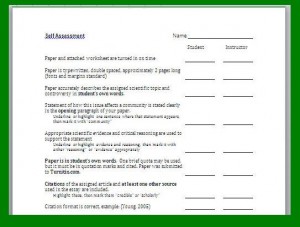Gina Barreca over at Brainstorm listed six ways to make grading easier, and immediately I was hooked. Like any kind of workers, profs love to talk about better ways to do the key tasks of the field. I had so many ideas, a blog post seemed a better place to summarize them than a comment.
Some of the things I’ve learned about grading:
 Self-assessment forms (see image) are great ways to reduce the work of grading papers. They’re probably old hat to lots of people who assign papers, but I never knew about them until my current job.
Self-assessment forms (see image) are great ways to reduce the work of grading papers. They’re probably old hat to lots of people who assign papers, but I never knew about them until my current job.
Take the papers everywhere with you until they’re graded. You never know when you’ll find yourself with down time that otherwise might be wasted; I’ve graded entire sets of exams while in line at the car wash! Or while waiting at the doctor’s, on the bike at the gym, during book clubs or writers’ groups…
Find special, luxurious places to grade. Last year I discovered that a local hospital had a first-floor cafe with big cushy armchairs beside a roaring fireplace. Nobody there knows me, and I can work uninterrupted. Our local nature center has a sunny room overlooking a prairie – again, nobody is in there except a wide assortment of native animals in terraria.
I also use the early morning hours. Grading is the only time I let myself go out to the bagel place for breakfast; an hour’s grading every morning over bagels and coffee, and the work is soon done! And for someone like myself who gives in-class exams, of course the first set of exams is graded while the second class is writing theirs. This would probably apply to your in-class writing assignments as well.
But really, grading is hard work. Why? Why is it so stressful, and how can we get at the root cause of grading resistance?
I think grading is a miserable chore because it puts me in an adversarial relationship with the students, and as a teacher I feed on the positive energy from my students and hate having to switch from a shared focus on how neat physiology is to a position in which I make judgments about them. Angst is the grader’s enemy. When I first began teaching, I agonized over every failing grade. Now I know more about what nurses have to do with the skills I’m teaching them, I think of failing grades as warnings my students need before they face the NCLEX. They’re paying me to give them these early warnings, and show them what to do about their problems before they’ve spent money on a nursing degree and failed the high-stakes exam – or worse yet, killed somebody!
I’ve also learned to post the grades online or email them to students before class meets. This lets students get their initial emotional response out of the way, and prepare themselves to approach me with a professional attitude. I email the students to let them know the grades are up, and include the necessary info about retakes, how much the assignment counts toward their grade, when I will hand it back, and what they should do next.
In the end, Gina’s advice to be nice is key. If I think of grading in any other light, it’s miserable. But if I take it as coaching, warning, advising and helping, I approach it differently. I stop being defensive or indignant about how students could have done so badly on an exam and instead focus on how they can improve. I lose the impulse to scold and instead tell them not to beat themselves up over a bad grade, because that distracts them from figuring out how to learn the material. I can also tell them to make their plans for what they’ll do if they fail the course, because being stressed about that distracts them from the material. Keeping a tunnel-vision focus on how they will learn the material takes away a lot of the associations that make grading so unpleasant, at least for me.








